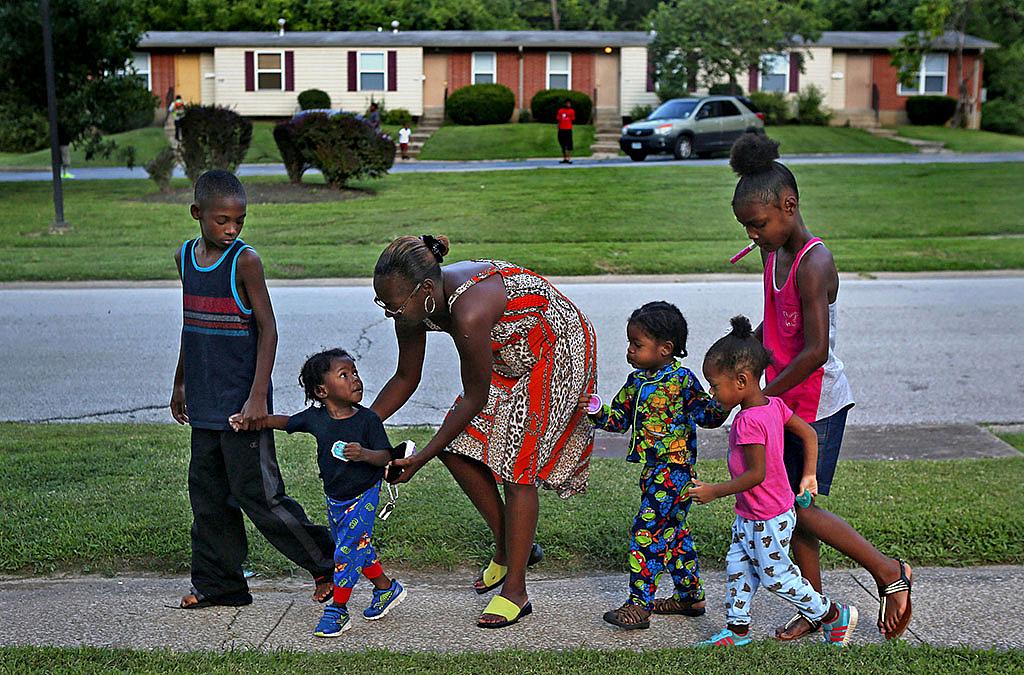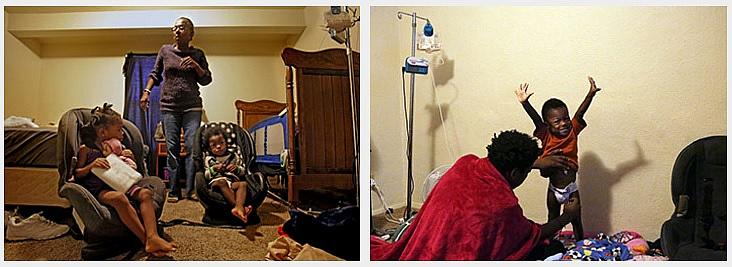The cycle of stress: The story of Darlene Evans
Nancy Cambria reported this story with the support of the Dennis A. Hunt Fund for Health Journalism and the National Health Journalism Fellowship, programs of USC Annenberg’s Center for Health Journalism. Other parts of this series include:
The Crisis Within: How toxic stress and trauma endanger our children
The science of stress: How trauma etches itself on brain, chromosomes

“I don’t let them go outside (alone) anymore,” says Darlene Evans, 45, as she takes a walk with her five youngest children in August in front of their home in the Northwinds Apartments in Ferguson. From left to right are Warren, 10; Alex, 2; Aaron, 3; Lexi, 2; and Destiny, 9. Four days earlier, several of her children witnessed a shooting across the street.
Born into stress
Darlene Evans, 45, a single mother of 10 children living on disability without a car, has been coping since childhood with dangerous levels of stress.
That stress can deeply affect her children, especially her youngest, twins Alex and Lexi, and their brother, Aaron.
Evans reflects how toxic stress attacks maternal health and then moves on to impair prenatal and early childhood well-being.
Her family, of the Northwinds Apartments complex in Ferguson near West Florissant Avenue, is precisely the kind of household that public health experts say needs support and programs.
That’s true even though her decision to have so many kids makes her unpopular in policy debate about who should receive federally funded entitlements.
And yet, the size of her family — combined with a lack of financial resources to manage it — is what poses perhaps the greatest risk of toxic stress harming her children.
An agonizing choice
Three years ago, Evans found out she was pregnant with twins. She put off prenatal care partly out of denial.
She had eight children already and had given birth to Aaron less than a year earlier. She found an agency to put the twins up for adoption.
The stress during her pregnancy was intense. Her older children had to put their lives aside and step in and care for the little ones. The relationship with the father was unstable.
When contractions started coming early, she was admitted to a hospital on bed rest. Baby Aaron, and her older children, Warren and Destiny, then around 6 and 7, were placed in temporary private foster care.
It pained Evans deeply to know another family celebrated Aaron’s first birthday and saw him take his first steps. She regrets it to this day.
On Feb. 4, 2013, Evans delivered Alex and Lexi 11 weeks early in what one doctor called “a life-or-death situation.” Chronic stress and maternal depression have been significantly linked to premature births.

The next day, Evans saw the twins in the NICU tethered to machines. Lexi had porcelain light skin and long delicate fingers. Alex “really looked like a big chocolate kiss.” She held little Alex against her skin.
“It was like a piece of flesh eating at me. Like saying, ‘You can’t do this,’” she recalled. “When I sat there, the only thing that came over my mind was a voice, like, ‘You had all these other children. You didn’t give them up, why should I give these up?’”
The decision to keep them led to more stress. Lexi once stopped breathing, and Evans revived her with CPR. Alex still uses a feeding tube.
At times Evans juggled the twins in one arm and Aaron in another. She recalls going into the bathroom and screaming at the top of her lungs under the pressure.
Even now, intense worries
The current stress of caring for five children under 12 can be so intense, Evans said, she sometimes hides in the closet off her bedroom and prays.
Even outside the household, she has grave worries. Her second oldest son is finishing out a federal sentence on a gun possession charge. She cobbled together the cash to pay for a private attorney to try to keep him out of jail.

“I try to think he’s around the corner or at his girlfriend’s house,” she said.
Evans vowed to raise her youngest children differently from the “spare the rod, spoil the child” way she was brought up.
She grew up in the Darst-Webbe public housing complex in St. Louis. Evans suffered multiple childhood traumas. When she was about 7, she saw a man roll out of an elevator and die from a stabbing. She attempted suicide before she turned 13.
“I just said things were going to be better for my children,” she said.
Her children do not go hungry. There are piles of clothes in the basement that Evans has procured from charities or purchased on discount. In December, a small Christmas tree was up and decorated by her kids in the living room. She is proud that her oldest daughter, Diamond, is in the Navy Reserve.
Parenting with stress
Evans’ own health problems, neighborhood turmoil and family disputes sometimes disrupt the household routine and her ability to parent. In late summer, after random gun violence erupted within feet of where the children were celebrating a birthday outside, the family could not sleep at nights. Mornings were a struggle.
Some days Destiny and Warren readied for school on their own. The twins and Aaron frequently slept until noon.
This is concerning because the children are at the tail end of a period of critical brain development where reading, communication and nurturing help the brain create vital neural connections. Research finds the absence of attention can stress the child and harm that brain development.
Getting critical help
Source: Health Assessment and Research for Communities Chart: Robert Hopwood, The Desert Sun
Evans took an important step last August when she enrolled the twins in First Steps, a state-funded home visit program for young children with disabilities and developmental delays.
When occupational therapist Susan Dutton first met the children, Lexi barely spoke beyond a whisper. Aaron was hyper and unable to follow directions.
Over three months of visits, the children drastically improved. Dutton further nudged Evans to enroll the twins in a free preschool program to get them up to speed.
A crisis
There was another stress that lurked in Evans’ household. Evans deals with high blood pressure, a condition that research suggests could be tied to the stress and trauma in her childhood.
In October she suffered a stroke and awoke in the hospital.
She was discharged a week later with a metal walker that her toddlers clung to while she walked. Evans ended up refusing to use it.
By December, seemingly of her own grit, she was walking normally.
[This story was originally published by St. Louis Post-Dispatch.]
Photos & videos by Laurie Skrivan/St. Louis Post-Dispatch.

